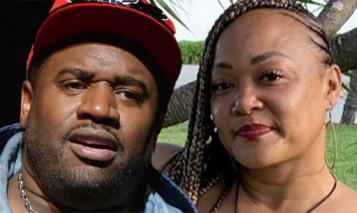
Richard Pryor was born on December 1, 1940 in Peoria, Illinois. Pryor’s alcoholic mother, Gertrude Thomas, abandoned him and his four siblings when he was 10. He spent his adolescent years living in a brothel run by his grandmother, Marie Carter.
His mother Gertrude was one of the prostitutes in Marie’s brothel.
Pryor never really knew his father, LeRoy Pryor, a former boxer and hustler who had a reputation as a ladies man.
Growing up in extreme poverty, little Richard struggled to concentrate on his lessons in school. He was sexually abused at age seven, and expelled from school at age 14.
At age 18, Pryor enlisted in the U.S. Army from 1958 to 1960. He spent virtually most of his time in the Army prison for stabbing a white officer who angered him while stationed in West Germany.
While enlisted in the Army, Pryor discovered he had a knack for making people laugh. He performed in amateur comedy nights and open mic shows.
After returning home to Peoria, Pryor found work as a master of ceremonies at a local nightclub.
He married his girlfriend and fathered a son – the first of his six children by five different women.
After Bill Cosby rose to national fame as a comedian, Pryor realized he had the talent to achieve success as well.
He began to hone his comedy skills, and in 1963, he moved to New York City to attempt to “make it in the mainstream.” There he launched his professional standup comedy career and made a name for himself in comedy nightclubs.
Pryor soon found steady work as the opening act for stars such as Bob Dylan and Woody Allen. During one of his first nights, he opened for pianist Nina Simone at New York’s Village Gate.
In her autobiography, Nina remembered Pryor’s severe case of opening night jitters.
“He shook like he had malaria, he was so nervous,” she recalled. “I couldn’t bear to watch him shiver, so I put my arms around him there in the dark and rocked him like a baby until he calmed down. The next night was the same, and the next, and I rocked him each time.”
Pryor soon caught the eye of a talent scout who booked guest appearances for him on The Ed Sullivan Show and The Merv Griffin Show. But the pivotal moment in his career came after the comedian made his first guest appearance on Johnny Carson’s Tonight Show on June 20, 1967.
As Pryor’s fame grew, so did his bank account – and his growing dependency on powder cocaine.
Movie studios showed interest in Pryor, and within a year, he starred in a Sid Caesar film, Busy Body.
In September 1967, Pryor experienced what he described in his 1985 autobiography, Pryor Convictions, as “an epiphany.” He said he walked onstage at the Aladdin Hotel in Las Vegas, and looked out at the packed house.
In the audience were Dean Martin and other movie stars of the day. “What the fuck am I doing here!?”, Pryor told the audience, and walked off the stage.
Pryor believed he was limiting himself by homogenizing his act for a certain audience. His jokes had no personal references. From that moment on, Pryor changed his standup comedy routine. He began to use profanity in his act, including the word “nigger”.
During this time, his parents died. First his mother in 1967, then his father in 1968.
In 1969, Pryor moved to Berkeley, California, where he immersed himself in the Black Power movement. He moved in the same circles as Black Panther leaders Huey Newton and Ishmael Reed.
In the 1970s, Pryor wrote comedy skits for popular TV sitcoms Sanford and Son, The Flip Wilson Show, and a 1973 Lily Tomlin special, for which he shared an Emmy Award.
He appeared in several popular films with majority Black casts, including Lady Sings the Blues, starring Diana Ross and Billy Dee Williams (1972), The Mack with Max Julien (1973), Uptown Saturday Night (1974), Car Wash (1976), and Which Way Is Up? (1977), as well as The Muppet Movie (1979).
Throughout the 1970s and ’80s, Pryor released groundbreaking comedy albums which earned him 5 Grammy Awards and 10 nominations. He won his first Grammy for his third, breakthrough comedy album, That Nigger’s Crazy, in 1974.
That Nigger’s Crazy was a commercial and critical success. It was eventually certified gold by the RiAA which (at the time) signified over 500,000 copies sold in the U.S.
After a contract dispute with Laff Records that nearly blocked his 3rd album from being sold, Pryor successfully negotiated his release from his contract.
Pryor went on to co-write the comedy film Blazing Saddles (1974), directed by Mel Brooks and starring actor Gene Wilder.
Pryor was cast to play the part of Bart, but the studio would not insure him, and Mel Brooks cast Black actor/comedian Cleavon Little as Bart.
By now Pryor’s cocaine addiction was an open secret in Hollywood. He even wrote his cocaine habit into his standup routines and comedy recordings.
In 1979, Pryor visited Africa. Upon returning to the United States, he said he was so moved by his experience in the motherland that he would never again utter the word “nigger” in his standup comedy routines.
Despite his life-changing experiences in Africa, Pryor couldn’t kick his dependency on cocaine, and in the 1980s, he began abusing an extremely addictive form of cocaine known as freebasing.
Freebasing is a process used to purify cocaine by dissolving the drug in a heated solvent such as ammonia or sodium hydroxide and removing the additives.
The refined (pure) coke powder is then smoked by burning it and inhaling the highly addictive fumes though a glass pipe. The result is an intense but short-lived high.
In 1981, Pryor was hospitalized with 3rd degree burns when he accidentally poured rum over his body and lit himself on fire while freebasing cocaine.
Pryor later admitted the accident was actually a suicide attempt.
In 1986, Pryor wrote, directed, and starred in the critically acclaimed autobiographical film Jo Jo Dancer Your Life is Calling, in which the lead character sets himself on fire in a drug-induced frenzy.
Later that year, Pryor was diagnosed with multiple sclerosis, a progressive neurological disease that affects mobility, movement of the limbs, sensation, memory, cognitive function, and speech.
His condition deteriorated over the years, and on December 10, 2005, Pryor died of a heart attack.
His wife, Jennifer Lee Pryor, would later say he died “with a smile on his face.”
In 2006, Pryor received a posthumous Lifetime Achievement Award at the 49th Annual Grammy Awards.
Richard Pryor was a pioneer, award-winning writer, director, and actor who rose from extreme poverty to become one of the greatest comedians of all time.
Reference sources:
1. Richard Pryor biography at Black History Now
2. “Richard The Great” NY Post
3. “The N-word and Richard Pryor” The New York Times
4. “Richard Pryor List of Grammys” Grammy.com
Photo by Henry Diltz/Corbis via Getty Images





